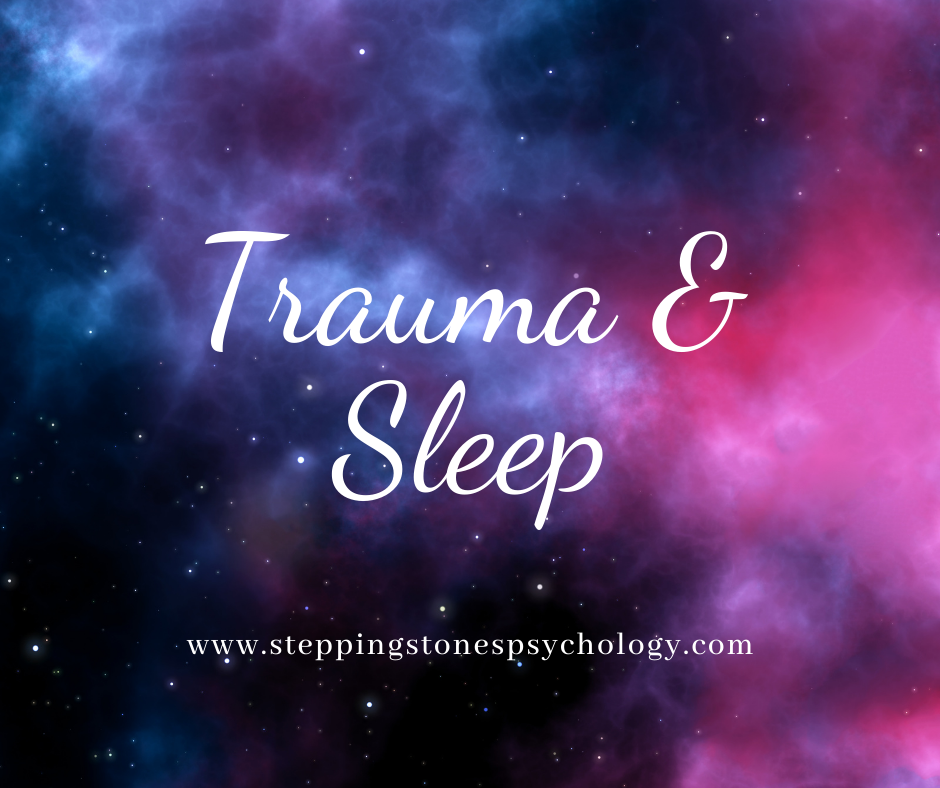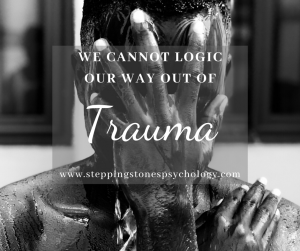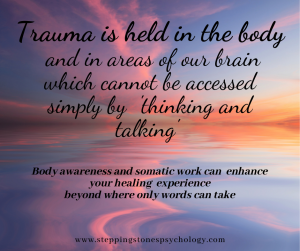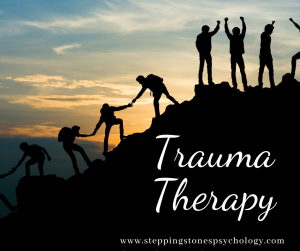It is very common for people who have experienced trauma or those with a diagnosis of PTSD to experience some form of sleep issues. Traumatic stress can negatively impact sleep in so many ways.
Most people with trauma or PTSD struggle to fall asleep even when they are tired, or they may wake up frequently during the night, or sometimes it is about difficulty falling back asleep, or they may wake up earlier than they intended. For trauma survivors, it is very common that even if sleep does occur, it rarely is a deep, restful sleep.
In fact, difficulty falling and/or staying asleep is considered one of the hyperarousal symptoms of PTSD, and studies have found that sleep problems are one of the most commonly reported symptoms reported by people with PTSD.
What are the reasons?
Trauma survivors often go through the day constantly in a hypervigilant condition. Hypervigilance is a state of heightened awareness we develop as a survival resource when we have experienced trauma. It is a survival resource because we develop it in order to protect ourselves from further harm.
This high level of arousal makes it extremely difficult to relax, and consequently, to fall asleep. The severe anxiety and stress associated with trauma contribute to the hyperarousal that carries on into the night. Hyperarousal includes behaviours like constantly being on guard, tense, and on edge. In other words, it is the opposite of being deeply relaxed. This inability to relax and instead being in a hyperaroused state may interfere with one’s ability to fall and/or stay asleep. Because of the hypervigilance and hyperarousal trauma survivors experience, they are more sensitive to sensory stimuli, even while asleep. This then results in them being more likely to wake up even in response to minor sounds.
Nightmare is another very common sleep issue among people who have experienced trauma or those with PTSD. So even if a person manages to have an early night and fall asleep, the frequent and terrifying nightmares will end up disrupting sleep. It is therefore very common for trauma survivors to be very tired and sleepy in the morning, and feel like they have not had much sleep.
Another large part of trauma and sleep is the issue around fear. There are probably a couple of fear-related issues when it comes to sleep, but I can think of two:
- Fear around sleep through association:
As trauma survivors often have sleep issues, they naturally tend to associate sleep time to these difficult moments, including associating them to their terrible nightmares. So they often develop fears about going to sleep and about having nightmares. These fears can then make it difficult to fall asleep.
- Fear of losing control:
Another fear may be fear of sleep such as viewing going to sleep as a loss of control. Trauma survivors have experienced traumatic moments in their lives where control was taken away from them. Not being in control is likely to make them feel vulnerable, trapped and scared. So not being in control may feel very anxiety-provoking and therefore it will hinder the person to be able to relax fully. Often all these are subconscious and unconscious processes. So one is not always even aware that they are being so anxious about sleep.
For some (**TRIGGER WARNING**), the origin of the traumatic events may have occurred during the night and this can cause fear associated with the presence of darkness and the time of the day. So on a surface level, it may look and feel like discomfort or general anxiety about falling asleep. As you prepare for the evening/getting ready for bed, this can be felt like being on edge or simply not being able to fully relax.
Usually, it is that on a deeper level there is the fear around feeling vulnerable during the night. This is commonly associated with past experiences of having experienced conflict or abuse as a child or hearing/being exposed to conflict or domestic abuse. For many people, this can also mean that they worry or think about their traumatic event as soon as they go to bed. This then keeps them up at night with insomnia and then with these horrible memories and related thoughts being the last thing on their mind before falling asleep, they continue processing these through nightmares. It becomes a vicious cycle.
What can you do?
As trauma survivors, it is all about putting time, effort and energy into planning and doing the little things which often come easy and natural to those who haven’t experienced trauma or don’t have PTSD. Firstly, taking conscious steps to do things that help you relax. Relaxing on a deeper level such as with your mind and body. If you are familiar with the Polyvagal Theory, you will know that in order to feel sleepy, you will need to relax. Relax from within and with every fibre of your muscle.
Below are some of the things I have found helpful (they may help you too. Maybe not, and that is absolutely ok too):
- Calming instrumentals
- Nothing stimulating, so even the instrumentals have to be slow-paced, low pitched and low volume
- Calm, low-volume nature sounds e.g. the sound of the forest, sea or crickets etc.
- A dark room with dim yellow-warm lighting
- Candles (I get the 8-hours tealight candle as it will burn throughout the night)
- Scented candle using whatever scent that helps you feeling calm and relaxed
- Some people prefer incense stick. This can help some people, but for those with breathing difficulties or asthma it might cause issues and then end up making you feel anxious, not relaxed
- Start doing wind-down and non-stimulating activities a few hours before bed
- Bath (not shower)
- Apply lotion or essential oil with a firm touch that will work as self-massage and help your muscles relax
- Journaling – but not about triggering topics (you could choose a different time of the day for that). Instead, you could focus this time for gratitude journaling. Here are some journaling prompts I can suggest for the evening use:
– What made me happy today
-What was the best part of the day (pick one moment and spend at least 5 minutes writing about this)
-What am I grateful for (list 10 things)
- I have found this guided meditation helpful: https://www.youtube.com/watch?v=vZNUswv5Fng&t=6s I have often recommended this meditation to my trauma clients. Many of them have reported that they have found it helpful too. However, this alone won’t help you fall asleep. The prerequisite is to find ways to help relaxing your body, with starting the process of relaxation few hours before getting ready for bed, and particularly when you are in bed. You may find this technique called Progressive Muscle Relaxation (PMR) helpful: https://www.anxietycanada.com/articles/how-to-do-progressive-muscle-relaxation
Other things which may help too:
- Making sure your bedroom/sleep area is a comfortable and relaxing space (if you are too tired or busy during the day or week to tidy it up and it looks cluttered, you can purchase a large storage box and keep everything which needs tidying up in there. That way the trick is that it looks decluttered and more relaxing, and you can gradually tidy things from the box whenever it suits you at your own pace)
- I used to have a bad habit of sometimes work in my bedroom. I have stopped that. If you keep it separate it will help associate your room to sleep. If you live in a studio where your bedroom is the same space you work, study and relax in, you could invest in a room divider between your bed and other areas.
- As trauma survivors tend to dissociate (some more than others), you may not be aware that you have not drunk much during the day. This may make sleep uncomfortable as you start dehydrating and get a dry throat during the night in your sleep. So try to have at least a few sips before going to bed when you are unwinding. You can also have a glass of water next to you so you don’t have to get out of bed in the middle of the night if you wake of thirsty.
The tips on this website may be helpful too:
Concluding Thoughts:
I hope you find this information and the recommendations helpful in terms of your mental health, wellbeing and healing. However, just a gentle reminder that what works for one person may not work for another, so it does not mean you are a failure if some of these don’t work for you. It is all about trial and error when we are finding resources for our growth. It s also important that you take things at your own pace and be patient, gentle and kind with yourself when you go on your healing journey. If there is one thing, I would like for you to take away from this blog, I hope it offers you some empathy and validation.
For more:
For more free tips and resources, please feel free to join my Trauma and PTSD group: https://www.facebook.com/groups/PTSDandTraumaSupportPackage
For ongoing support through a dedicated membership for trauma survivors at a low cost, please follow this link: https://steppingstonespsychology.com/membership-for-trauma-survivors
© Sharmi Gowri-Kriszyk under Stepping Stones Psychology 2020




